|
|
|
Sort Order |
|
|
|
Items / Page
|
|
|
|
|
|
|
| Srl | Item |
| 1 |
ID:
086953
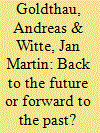

|
|
|
|
|
| Publication |
2009.
|
| Summary/Abstract |
Current public policy debates on energy security are characterized by a singular focus on questions regarding access to resources. This lopsided attention to the geopolitical dimension of energy security is based on the myopic and erroneous presumption that global energy politics is necessarily a zero-sum game in which one country's energy security is another's lack thereof. In fact, debates deflect attention from the real issues that policy-makers should consider in their attempts to foster effective global energy governance-the central role increasingly international energy markets play in balancing demand and supply-and, even more importantly, the significance of the 'rules of the game' that structure these markets. This article makes a first attempt to apply a broader analytical lens by pointing out and analyzing the important role rules play in determining outcomes in international oil and gas markets; by examining how current trends are affecting the existing 'rules of the game'; and by highlighting consequences for public policy.
|
|
|
|
|
|
|
|
|
|
|
|
|
|
|
|
| 2 |
ID:
086947
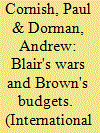

|
|
|
|
|
| Publication |
2009.
|
| Summary/Abstract |
The Labour government's 1998 Strategic Defence Review (SDR) marked the end of almost twenty years during which Labour had been little more than a bystander in British defence policy-making. The 'foreign policy-led' SDR marked an impressive and authoritative debut, emulated by other national governments. Ten years later, however, the SDR is a fading memory. British defence is out of balance and facing immense stress, and calls are mounting for a new strategic defence review. This article examines the difficult choices which a defence review would have to make. But a defence review also requires the governmental machinery with which to analyse and understand defence, and with which those difficult choices can be made. The article argues that this machinery is wearing out. Defence policy, planning and analysis in the United Kingdom have reached a state of organizational, bureaucratic and intellectual decay which may be irrecoverable.
|
|
|
|
|
|
|
|
|
|
|
|
|
|
|
|
| 3 |
ID:
086951
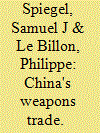

|
|
|
|
|
| Publication |
2009.
|
| Summary/Abstract |
China is among the largest exporters of arms to the developing world and is often criticized for exacerbating violent conflicts in Africa. This article examines geopolitical tensions surrounding some of China's most controversial weapons alliances, rethinking the role of the global media, state leaders and non-state actors in forming fragmentary movements of 'resistance'. Focusing on the tensions around a shipment of Chinese arms to Zimbabwe during a period of mid-election repression and violence in 2008, this article is a media content analysis on the debates about diplomacy, arms embargoes, regime violence, protests against the Beijing Olympics, and efforts by China to counter western critics. The article argues that more rigorous diplomatic efforts to block the weapons were required and that the moral and political hazards of unreflexive foreign policy analysis emboldened the Chinese authorities' denial of their responsibilities. Beyond the case of Zimbabwe, we suggest that a deeper and wider understanding of 'geopolitical resistance' against violence is vital.
|
|
|
|
|
|
|
|
|
|
|
|
|
|
|
|
| 4 |
ID:
086945
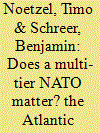

|
|
|
|
|
| Publication |
2009.
|
| Summary/Abstract |
This year NATO will celebrate its 60th anniversary. So far the world's most powerful military alliance has been a remarkable success story. However, as the first decade of the new century draws to a close there appears to be a widening strategic rift among the allies. 'Two-tier NATO' is by now an established piece of shorthand in international strategic debate to indicate an 'alliance à la carte' divided into two or more factions of member states with divergent interests. Evidently, the alliance increasingly struggles to reach consensus on a whole range of strategic issues. So is NATO on a path to disintegration and, ultimately, to failure? This article argues that the organization has developed from a fixed 'two-tier' into a rather fluid 'multi-tier' alliance. On many issues the alliance is in fact divided into several different camps that are pushing in different directions. Thus, allies can be grouped into one of three tiers: a 'reformist', a 'status-quo' and a 'reversal'-oriented one. While the evolution of such a multi-tier alliance will not inevitably result in NATO's demise unmanaged, this manifestation of camps will continuously disrupt the organization's strategic agility. The article finds that if NATO is to maintain strategic vitality, it needs to develop new institutional mechanisms and establish a consensus on its strategic posture in the changing international order and to make 'variable geometry' work.
|
|
|
|
|
|
|
|
|
|
|
|
|
|
|
|
| 5 |
ID:
086946
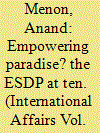

|
|
|
|
|
| Publication |
2009.
|
| Summary/Abstract |
Since its formal launch in June 1999, the European Security and Defence Policy (ESDP) has developed at a remarkable rate. In the subsequent decade, the EU has carried out 22 ESDP military and civilian operations and become an important element of Europe's ability to respond to international crises. For all this, however, there remain grounds for concern. These relate in part to the fact that, for all the early activism of ESDP, those military missions undertaken to date have been relatively limited in size and scope. The EU has also strikingly failed to intervene in certain crises that once seemed ideally suited to an ESDP deployment. The ESDP has also to a degree failed to bring about the enhancement to European military capabilities that some had hoped would be its major achievement. More generally, there is a danger that an exclusive focus on EU security policies will serve merely to distract member states from the broader international strategic environment, with ESDP serving as an alibi for their continued failure to live up to their international security responsibilities.
|
|
|
|
|
|
|
|
|
|
|
|
|
|
|
|
| 6 |
ID:
086949


|
|
|
|
|
| Publication |
2009.
|
| Summary/Abstract |
Can history help the 'war on terror'? It is a cliché that 9/11 changed the world. But the idea that the war is exceptional lacks historical perspective. Assuming a radically new threat, the Bush administration proclaimed a theology rather than a coherent strategy. It articulated the 'war on terror' as a utopian and unbounded quest for absolute security. It did not effectively measure costs against risks or orchestrate ends, ways and means. This led the United States into exhausting wars of attrition. A more careful dialogue with the past can address this. Containment, America's core idea during the Cold War, supplies a logic that can inform a prudent strategy. Like Soviet communism with its fatal self-contradictions, Al-Qaeda and its terror network is ultimately self-destructive without major military operations. America and its allies can contain it with more limited measures in the long term as it destroys itself. The US should show restraint, doing nothing to hinder the growing Islamic revolt against Al-Qaeda. In other words, fight small and wait.
|
|
|
|
|
|
|
|
|
|
|
|
|
|
|
|
| 7 |
ID:
086952


|
|
|
|
|
| Publication |
2009.
|
| Summary/Abstract |
This article takes the state of health in the world today as the starting point for a backward look at the trajectory that has led to our current position and speculation about prospects for improved global health in the future. Our model of social development and its dominant value system, which has promoted scientific progress but has also brought about great social, economic and health instability, is interrogated. This leads to questions such as what it means to be healthy and what the practice of medicine is about. Three potential scenarios for global health in the future are outlined. It is suggested that deep introspection about our current value system is required to achieve a paradigm shift that could reverse current trends and lead both to improvements in health globally and to less human insecurity. The authors conclude that while we have the material resources to achieve ambitious goals we may lack the moral and political will to do so. An expanded discourse on ethics and human rights-as well as on the limits of what is politically possible- may provide the impetus to drive change towards an improved global economic system and better health globally.
|
|
|
|
|
|
|
|
|
|
|
|
|
|
|
|
| 8 |
ID:
086950
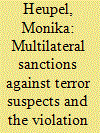

|
|
|
|
|
| Publication |
2009.
|
| Summary/Abstract |
The UN and EU sanctions regimes against suspected terrorists at first clearly violated commonly accepted due process standards. Both organizations gradually reformed the procedures that regulated which individuals and entities were subject to sanctions, yet the UN procedures in particular still evince important shortcomings. While international law scholars have debated how the sanctions regimes must be designed to be consistent with international law, political science scholars have, as yet, largely held back from looking into why the regimes evolved in the way they did. This article suggests that court decisions and proceedings and, in the case of the UN, falling commitment from member states, have prompted the UN Security Council and the Council of the EU to implement limited reforms. However, courts did not challenge the sanctions regimes per se and there was no substantial pressure from civil society actors. Moreover, owing to the competences and working methods of the UN Security Council and the Council of the EU, powerful member states could fairly easily deflect reform proposals from disaffected states and other UN and EU bodies.
|
|
|
|
|
|
|
|
|
|
|
|
|
|
|
|
| 9 |
ID:
086948
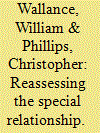

|
|
|
|
|
| Publication |
2009.
|
| Summary/Abstract |
The resignation of Tony Blair as British Prime Minister and the transition from Bush to Obama in the US mark the end of the second revival of the US-UK special relationship. The classic era of the special relationship began under the Labour government in the 1940s, though it was Winston Churchill who inspired the concept. It ended with the resignation of Harold Macmillan in 1963. Margaret Thatcher revived close personal relations with the US President as a guiding principle of UK foreign policy and Tony Blair successfully revived them again, even though the end of the Cold War had transformed the framework of transatlantic relations. Over the past 60 years US-UK relations have embedded specific security arrangements which have persisted, largely unquestioned, through the ups and downs of political relations at the top: close links between the two countries' armed forces; access to defence technology and procurement; intelligence ties through the UKUSA Agreement; a semi-independent nuclear deterrent and provision of military bases in the UK and its overseas territories. Public debate on the costs and benefits of these links has been limited; successive governments have discouraged a wider debate. The Obama administration enters office with few of the personal ties to Britain and to English culture, which have underpinned the special relationship. Earlier US administrations have approached relations with the UK from the perspective of US interests, while many British political leaders have felt-and have hoped to find in Washington-a sentimental attachment to Anglo-American partnership. British foreign policy would benefit from a reassessment of the structures of US-UK relations in terms of British interests, costs and benefits.
|
|
|
|
|
|
|
|
|
|
|
|
|
|
|
|
|
|
|
|
|